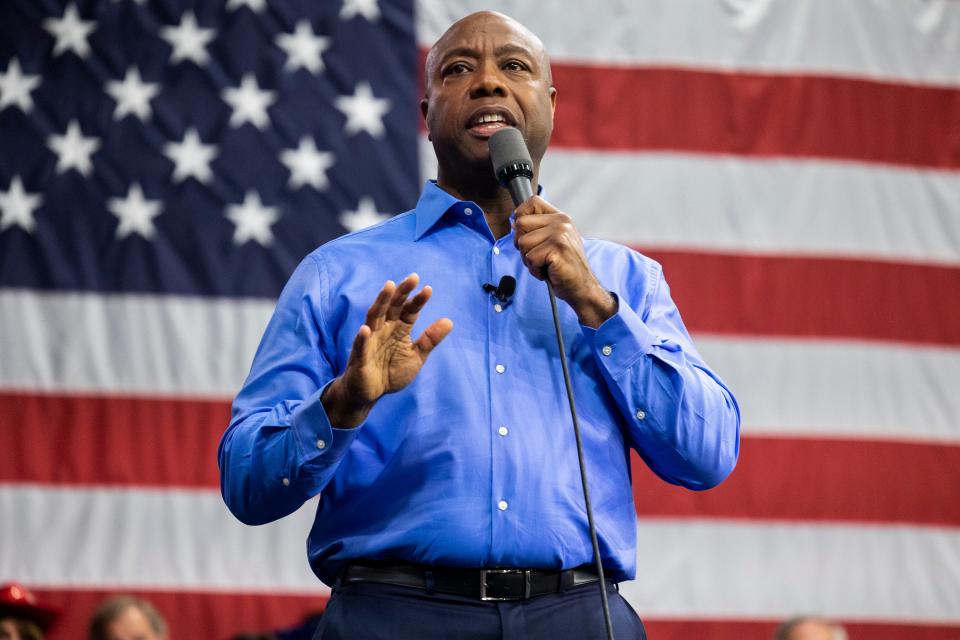Here's how Democratic, Republican 2024 candidates voted on the debt ceiling deal
- Oops!Something went wrong.Please try again later.
- Oops!Something went wrong.Please try again later.
WASHINGTON − It was a mixed bag of support and opposition for the debt limit deal from lawmakers who have announced 2024 Senate and presidential campaigns.
The Senate on Thursday approved the bipartisan agreement to avoid a catastrophic default on the nation's debt. But that doesn't mean all lawmakers supported the legislation − or followed their party's leadership.
GOP opposition, for example, stemmed from the need to reduce government spending and limit President Joe Biden's spending power.
One presidential candidate, Republican Sen. Tim Scott of South Carolina, opposed the debt limit bill.
Smart analysis delivered to your inbox: Sign up for the OnPolitics newsletter
Here's how lawmakers who announced campaigns ahead of 2024 voted on the legislation:
GOP contenders for Senate seats

West Virginia Republican Rep. Alex Mooney, who is challenging Democratic Sen. Joe Manchin in the West Virginia Senate race, was a "no" vote Wednesday night on the debt limit bill.
Mooney said the country needs to reduce government spending and its debt.
"I made a promise that I would fight the fiscal irresponsibility of the Biden Admin and I am keeping my word," he tweeted.
Indiana Republican Rep. Jim Banks, who is running for a Senate seat that will be vacated by Republican Sen. Mike Braun, didn't cast a vote Wednesday night. However, a spokesperson for the Indiana lawmaker said the vote closed as Banks was walking on the floor. He later registered a "no" vote with the House clerk.
"We can’t write Joe Biden a blank check for the rest of his presidency!" he tweeted.
Countdown to 2024: These candidates have already announced Senate plans for next election
California Senate candidates split on debt limit bill

Three candidates in the competitive California Senate race to fill retiring Sen. Dianne Feinstein's seat were split in their support for the debt limit bill.
California Reps. Katie Porter and Barbara Lee, who are both members of the Congressional Progressive Caucus, opposed the legislation.
Porter is an advocate for abolishing the debt ceiling. She tweeted it has no purpose "other than driving brinkmanship." Lee said the deal does not reduce the deficit and explained she supports passing a clean debt ceiling bill.
Rep. Adam Schiff, who is also running for the California Senate seat, voted in favor of the bill, saying in a statement he voted to stand with California families.
“While the agreement President Biden negotiated was far from perfect, this was a necessary step to protect our economy and Californians," he said.
More: Lee, Porter, Schiff running in the 2024 California Senate race. Here's how they will stand out
Other Democratic Senate candidates vote 'yes'

Michigan Democratic Rep. Elissa Slotkin is running for the Michigan Senate seat being vacated by current Democratic Sen. Debbie Stabenow in a race that could provide Republicans with an opportunity to turn a swing state red. She supported the debt limit bill in the House.
"I voted for the debt limit agreement to make sure the United States doesn’t go over a fiscal cliff," she tweeted. "This bill is far from perfect, but I supported it to avoid dragging the country into a recession."
Arizona Rep. Ruben Gallego, who is running for Senate to challenge Sen. Kyrsten Sinema, an independent who left the Democratic Party, also backed the bill to avoid a default.
"In a Congress marked by division, this compromise reflects the reality we face. It safeguards our accomplishments and ensures the well-being of hardworking Arizonans," he tweeted.
Presidential contender Tim Scott opposes debt limit legislation

Scott launched his presidential campaign last month and opposed the debt limit bill on the Senate floor Thursday.
"Is it in our best interest as a nation to allow Joe Biden, someone who we cannot trust on spending, to have an open checkbook ... until the end of his term?" Scott said during an Axios event Wednesday.
Scott did praise House Speaker Kevin McCarthy for doing a "good job" negotiating with Biden, but he alleged the deal allows Biden to continue spending with no limit, which he can't support.
This article originally appeared on USA TODAY: How 2024 candidates in the House, Senate voted on debt ceiling deal

